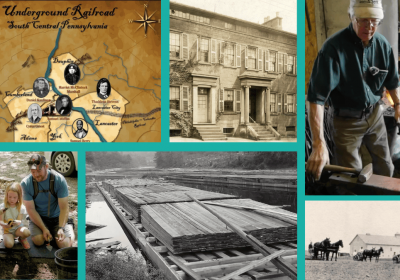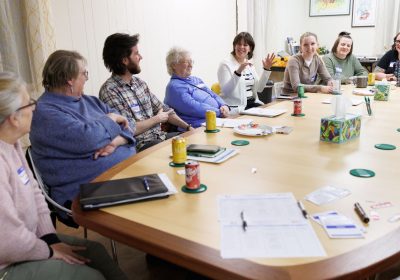First executive director Charles MacKay shares his reflections
By Karen Price
Fifty years ago, a group of academics and university personnel joined together with individuals from business, labor, the media and civic organizations from across Pennsylvania to consider the humanities. More specifically, to consider how they might implement a program that would encourage members of academia to engage in dialogue with the out-of-school adult population of the commonwealth about the humanities related to issues of public policy.
They called themselves the Humanities in Pennsylvania, or “HIP,” and there was plenty to consider.
The Supreme Court had recently overturned state bans on abortion in the Roe. vs. Wade ruling, the U.S. involvement in the Vietnam War ended and the Watergate Scandal was playing out before the nation. In Pennsylvania, many communities were still grappling with the recovery from devastating flooding from Hurricane Agnus in June 1972.
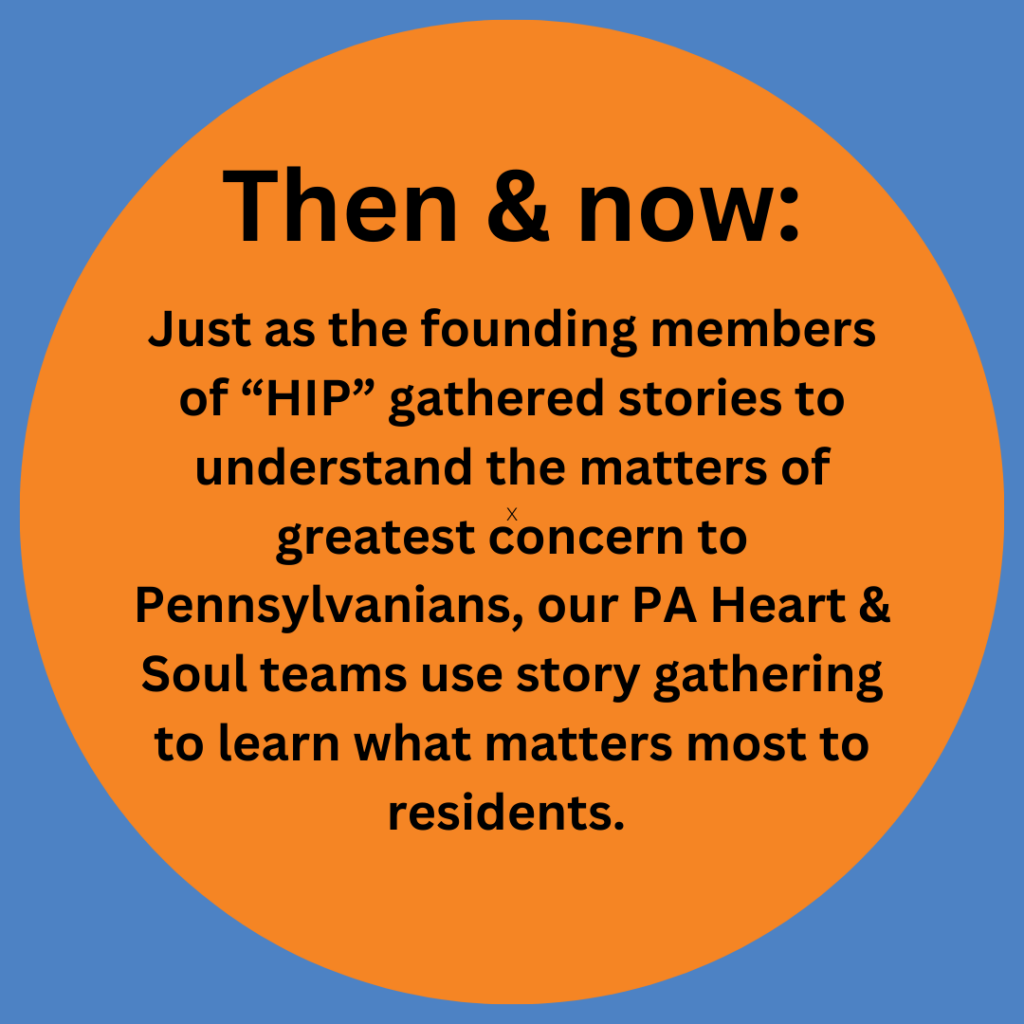
This year, PA Humanities is celebrating its 50th anniversary and wanted to take a look back at how we began. HIP’s original mission of giving everyday people the opportunity to connect, better understand current issues, and take positive actions using the insights of the humanities set the foundation for how we continue to work today.
One of the first steps for organizers was canvassing the state to learn more about residents’ greatest concerns. Based on the stories they heard, they decided on a theme for the first grants, “The People of Pennsylvania and Their Institutions: Who Does What?” The committee then solicited submissions for projects that would explore how Pennsylvania residents and their institutions “can develop and foster individual respect, personal security and justice in the neighborhoods and communities of the Commonwealth.”
Most proposals came from institutions of higher education, the committee noted in its first report to the NEH, but of those funded, two that stood out to the committee were:
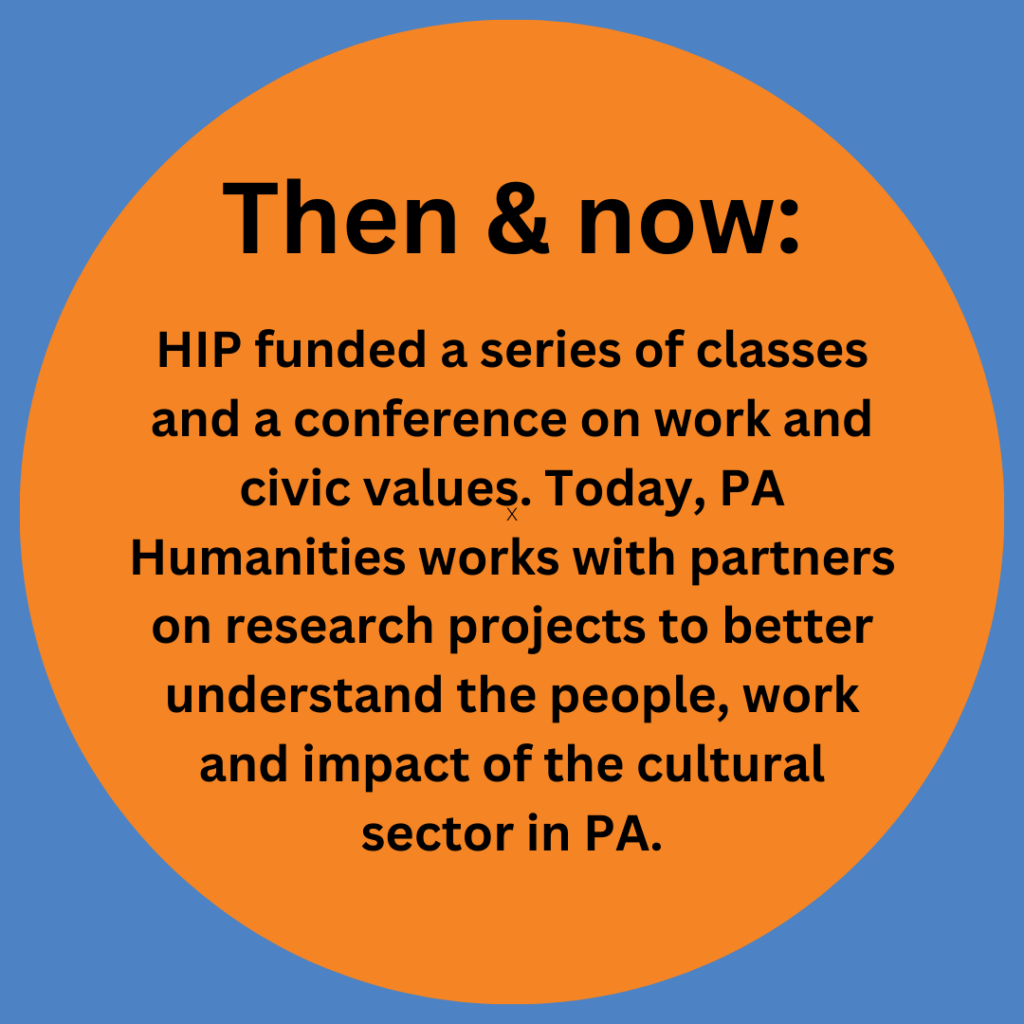
- The Institute for the Study of Civic Values, which received a $4,995 grant for “Work and Civic Values,” two six-week classes and a conference on issues related to work and civic values (for example, whether employees are becoming more concerned about performing meaningful services than demanding high salaries and whether employers are providing decent working conditions)
- An ad hoc group from Meadville and Crawford County, which received $4,070 for “The Public Schools: Who Does What,” a series of three town meetings to provide a forum to promote increased understanding of the public schools, their philosophy, administration, responsibility, and effect on the community. These were held against a background of community tension over a teacher’s strike and racial violence.
As the committee noted in its report, the range of issues in the projects approved not only showed the wide appeal of the program, but also “gave strong indication of the potential of the state-based program to provide citizens with an important way of dealing with timely issues.” Those included problems of school-community relationships, the “disturbing growth of systematic and centralized information gathering about the individual’s confidential affairs,” the “potentially devastating impact of unplanned or opportunistic economic expansion on neighborhood and ethnic cohesiveness in stable communities,” and the “systematic disruption by accelerated economic, urban and industrial growth of centuries-old conservative cultures of the Amish and others.”
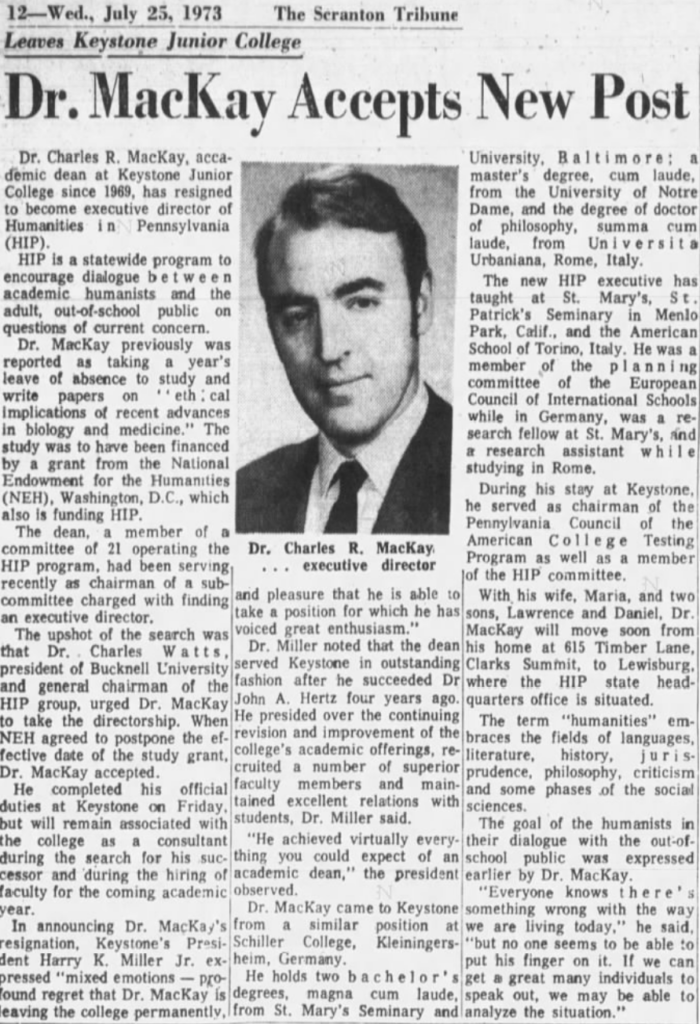
In the first two regrant periods, HIP reviewed 43 applications, making awards to 14 projects for a total of $88,386, with matching contributions of $96,081. Awards ranged from $1,855 to $14,859, with an average of $6,170.
Charles MacKay was a member of the founding board of HIP and a member of the search committee to discover the first executive director, a post he was ultimately offered. At the time, he was academic dean of Keystone Junior College who had recently taken a leave of absence to study bioethics using funding provided by the NEH. When the NEH agreed to postpone the date of the study grant, Charles took over leadership at HIP. He went on to work for more than 30 years at the National Institutes of Health after getting the humanities council off the ground.
We recently spoke with Charles to learn his thoughts and reflections on some of those early grants and how the issues and subject matter of interest then compare to the issues of today.
Q: Looking back at the first 14 grants, do any of the projects stand out to you?
A: Yes, several do. And I credit the grantees for coming up with the ideas. They picked up on the need for discussion and engagement with the general public, which was the focus of the program, to get engaged with them and begin a dialogue to illustrate some basic principles of the humanities. Whether it be the history, where we came from, where we’re going, or simply the discipline of formal logic so you could differentiate your passions and your emotions and your biases from the facts and the truth, separate them out, and also find a common bond with the various parties to any controversy or discussion. They sensed this was needed.
I was most intrigued by the policing and by the prisoner projects because they were the most farsighted, given where we stand today with the explosion of these issues in our society and the gap between different parties as to how to address the situation. I thought those were very clairvoyant on the part of people to see those issues because it was a different era. Those two struck me as I would not have thought at the time of their importance.
Q: What were some of the conversations like among committee members in those early days of grantmaking?
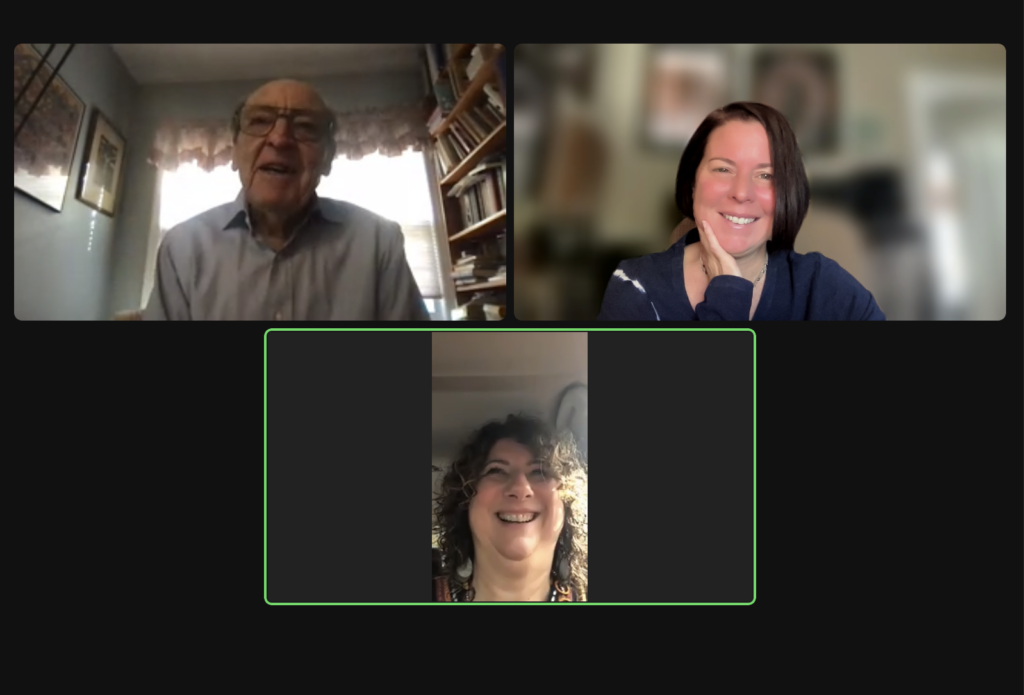
A: First, a general observation, that the committee, I think, was somewhat disappointed in the initial responses of the grants. They expected that this would stir in the academic community an effort of outreach. In fact, it was mainly community groups that went out and identified academics that they knew who could be involved, so the thrust of some of the projects was more sociological than humanities and they felt that was a disadvantage. There were some civic groups that were eager to get their message out, but they didn’t know what a humanist could do for them. They really wanted trouble-shooters and the humanities branch of academic institutions doesn’t have trouble-shooters, it has trouble-makers!
Q: The Lycoming College symposiums presented the issue of cultural survival in a rapidly-changing and technically complex world, and another grant dealt with the role of policing, which you mentioned, yet another with migrant policies. These are obviously all issues that we’re still grappling with in this country, along with many others. How do the issues of the day that the first 14 grants addressed compare to today’s most pressing issues?
A: What most amazes me is there have been no new issues. I look at the 14 grants and say, ‘Wow, we’re still dealing with the same basic problems.’ And I think the current climate in the country politically is evidence of the fact that they may have been tackled numerous times from all angles, but we haven’t made much progress. They only seem to be accumulating with a kind of rapid pace of a rolling stone. So I guess we’re doing the right thing with our lives by focusing on the humanities because I do think they offer any number of approaches and bring in the values of our cultures and society. But I see the issues being discussed for grants and the outreach back then resembling very much what we have today, which is astounding.
But you (at PA Humanities) have expanded so much more. You’re more imaginative than in our day. We were grasping with what it is that the humanities could be doing, and we didn’t have a great source of ideas. You’ve come a long way. I’m just astounded at the number of programs and runoff of programs and communities of interest. It’s just wonderful. But the problems we identified back then, or our grantees identified back then, are still plaguing us these days. I don’t think the humanities is failing, but I do think it’s important to know that maybe the fresh approaches that you and your colleagues have undertaken can make a better start for it.
Here’s a full list of the first 14 grant recipients, pulled verbatim from the archives, along with information about the amount awarded and the project as it was listed in reports back to the NEH.
Winter 1973-74 Grant Recipients
Sponsor: Northampton County Area Community College
Amount: $5,880
Project Title: Problems of Personal Privacy and Public Knowledge in Lehigh Valley
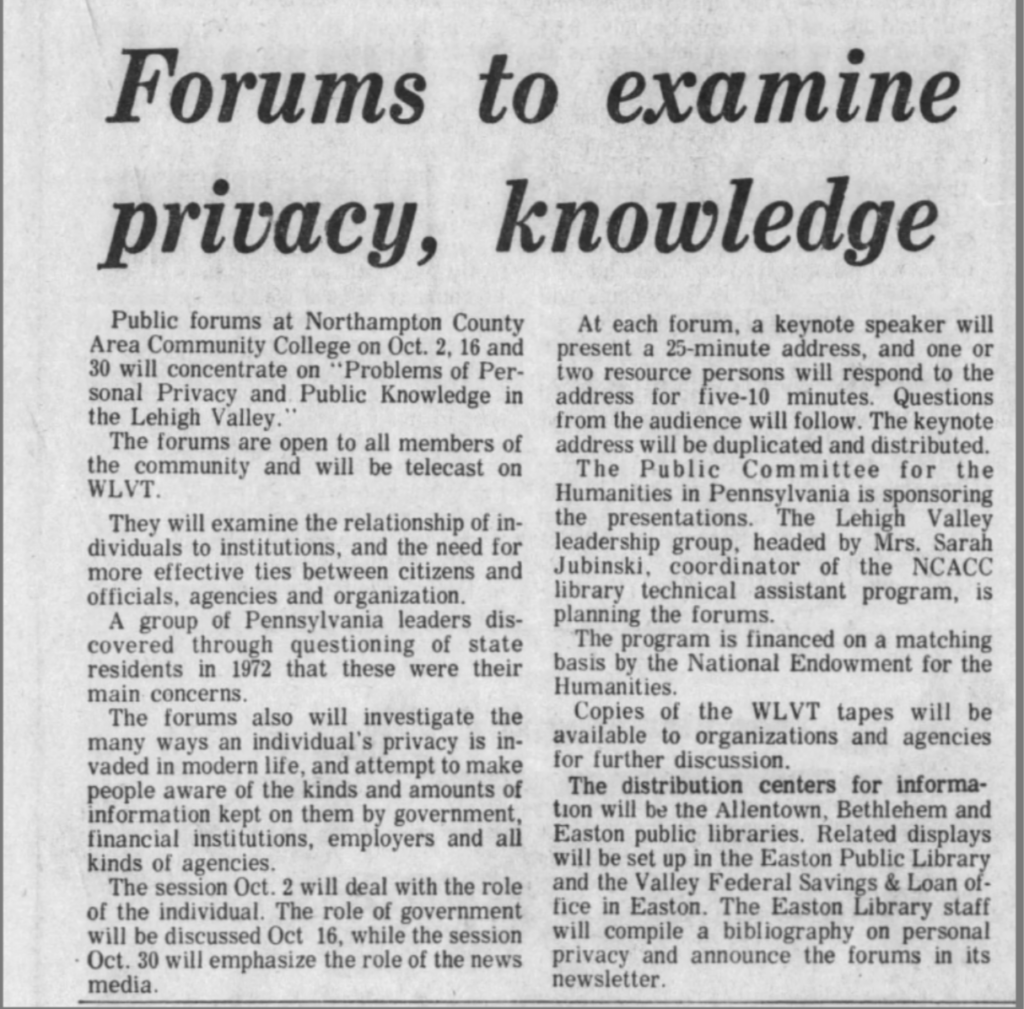
Description: Three public forums on the role of government, the role of the individual and the role of the news media. Each forum features a prominent humanist, whose address will be followed by commentary by three representatives of various community interests.
Sponsor: Lycoming College
Amount: $4,050
Project Title: Cultural Survival: Thoughts on the Future for the Citizens of Central Pennsylvania
Description: A three-day workshop on the future, including presentations on areas related to future planning. A keynote address on “The Prospect for Humanity’ by R. Buckminster Fuller. Wide community interest via media and community meetings and film series. The project is designed to present the issue of cultural survival in a rapidly-changing and technically complex world. Symposia feature fifteen humanists from Pennsylvania and the nation.
Sponsor: Institute for the Study of Civic Values
Amount: $4,995
Project Title: Work and Civic Values
Description: Two six-week classes and conference on issues related to work and civic values: whether employees are becoming more concerned about performing meaningful services than demanding high salaries: whether employers are providing decent working conditions; and whether employees can fulfill the country’s highest civic values in the course of a job. Discussion with union members, welfare recipients, mothers in day care centers, and academic humanists concerned about issues of work within existing institutions.
Sponsor: Elizabethtown College
Amount: $3,560
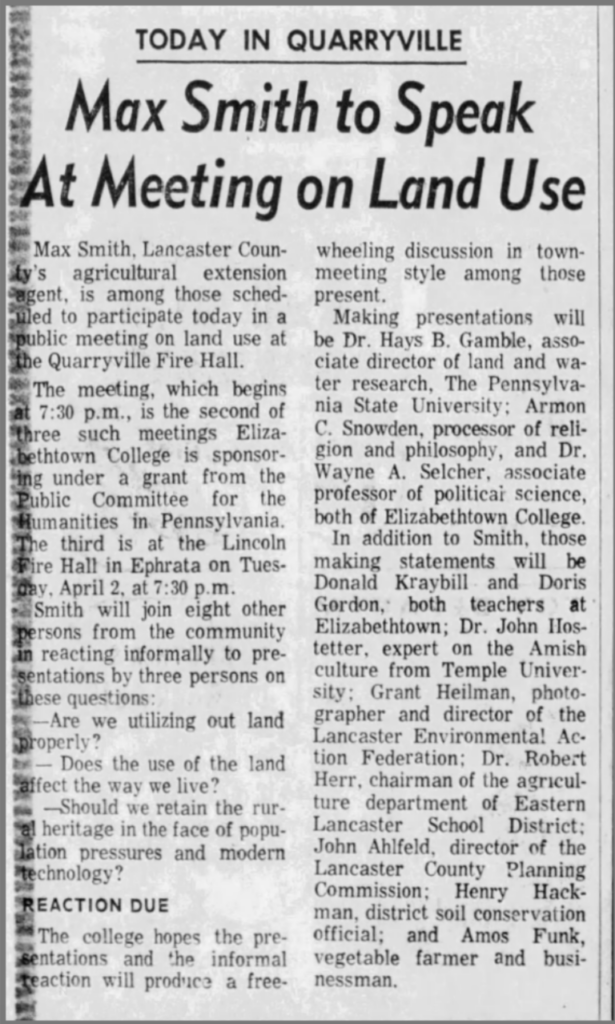
Project Title: Impact of Modern Technological and Environmental Change Upon the Rural Conservative Cultures of S. Eastern Pennsylvania
Description: Three open community forums to discuss the impact of modern technology and change on the area, with particular emphasis on land utilization, value systems and lifestyle, and population. Discussion led by humanists from the College staff, representatives of several conservative cultures, and representatives from industrial and commercial interests.
Sponsor: High Up Inc. (Health in Greater Hazleton with the University of Pennsylvania)
Amount: $11,000
Project Title: Controlled Growth in Hazleton
Description: A series of open forums throughout the Greater Hazleton Area to create awareness and concern for controlled growth and to provide large scale public participation in airing results of a HIGH-UP social, cultural, economic and ecological survey. Presentations and discussions by humanists.
Sponsor: Meadville Ministerial Association, Crawford Central PTA, and Others
Amount: $4,070
Project Title: The Public Schools: Who Does What?
Description: Three town meetings to provide a forum to promote increased understanding of the public schools their philosophy, administration, responsibility, and effect on the community. The objectives of these sessions are to view local government from the perspective provided by the humanities and to gain insight for creating increased understanding be- tween citizens and school officials.
Spring 1974 Grant Recipients
The next round of grants saw proposals from higher education institutions, citizens groups, private agencies, planning bodies, coalitions of local public agencies, and regional education services. Audiences for awarded grants included seniors, multicultural groups, personnel serving migrant farm workers, residents receiving social services and aid, law enforcement, prisoners, and urban and rural populations.
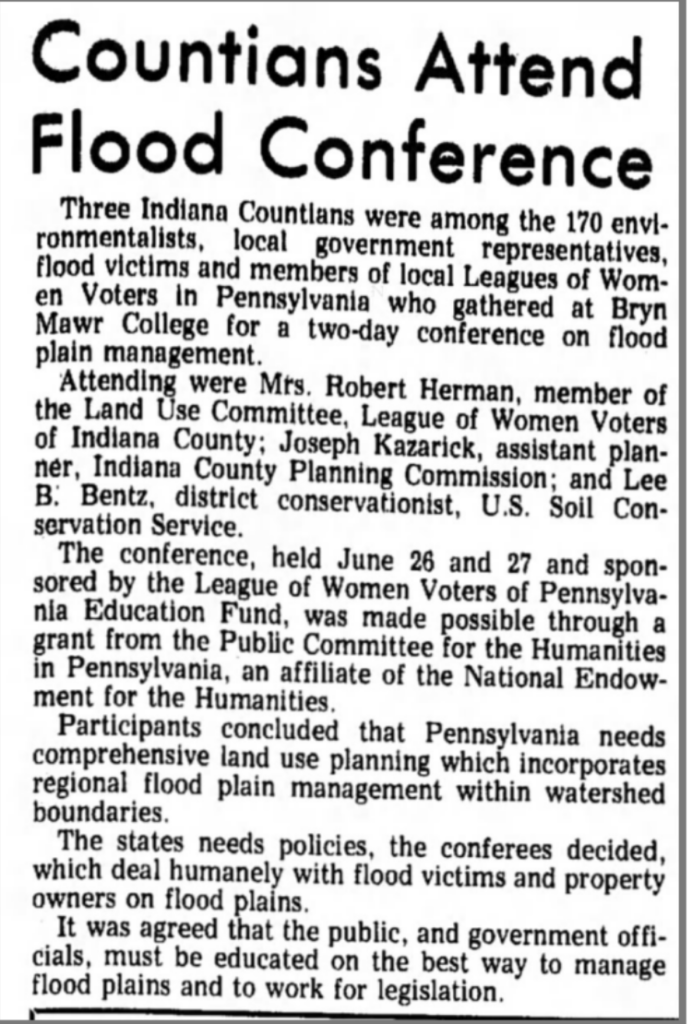
Sponsor: League of Women Voters of Pennsylvania (Educational Fund)
Amount: $14,850
Project Title: Flood Plains: Public Interest on Private Property Rights
Description: State-wide conference for league representatives, local leaders and humanists to examine problems and possible solutions of effective floodplain management that recognizes both individual rights and general welfare.
Sponsor: Government Study Commission of Pittsburgh and Pittsburg League of Women Voters
Amount: $9,600
Project Title: A Program of Public Discussion on the Suggested New Home Rule Charter for Pittsburgh
Description: A program of wide public discussion, involving the media, to examine major issues raised by the proposed home rule charter in relation to the humanities.
Sponsor: The Crime Commission of Pennsylvania
Amount: $1,855
Project Title: Role of the Police in the 70s
Description: One day conference of police officials, humanists and community leaders to discuss the police function, practice, and policy in the light of recent mendations on criminal justice standards and goals.
Sponsor: Citizens Advisory Board to the Northumberland County Board of Assistance
Amount: $6,814
Project Title: Welfare – Who Needs it?
Description: Three one-day seminars to discuss pressing social issues (human communication barriers, health services, problem drinking) in relation to human needs and services in the principal Northumberland County communities.
Sponsor: Senior Citizens Service Center/Sto-rox Senior Citizens Assn. /F.0.R. Sto-rox Neighborhood Corp.
Amount: $5,450
Project Title: Senior Power – The Influence of Senior Involvement in Society
Description: Twelve seminars on the historical, psychological, social, economical, political, and theological perspectives of “senior power.”
Sponsor: College Misericordia (State Correctional Institution at Dallas)
Amount: $2,210
Project title: The Humanities and Prison
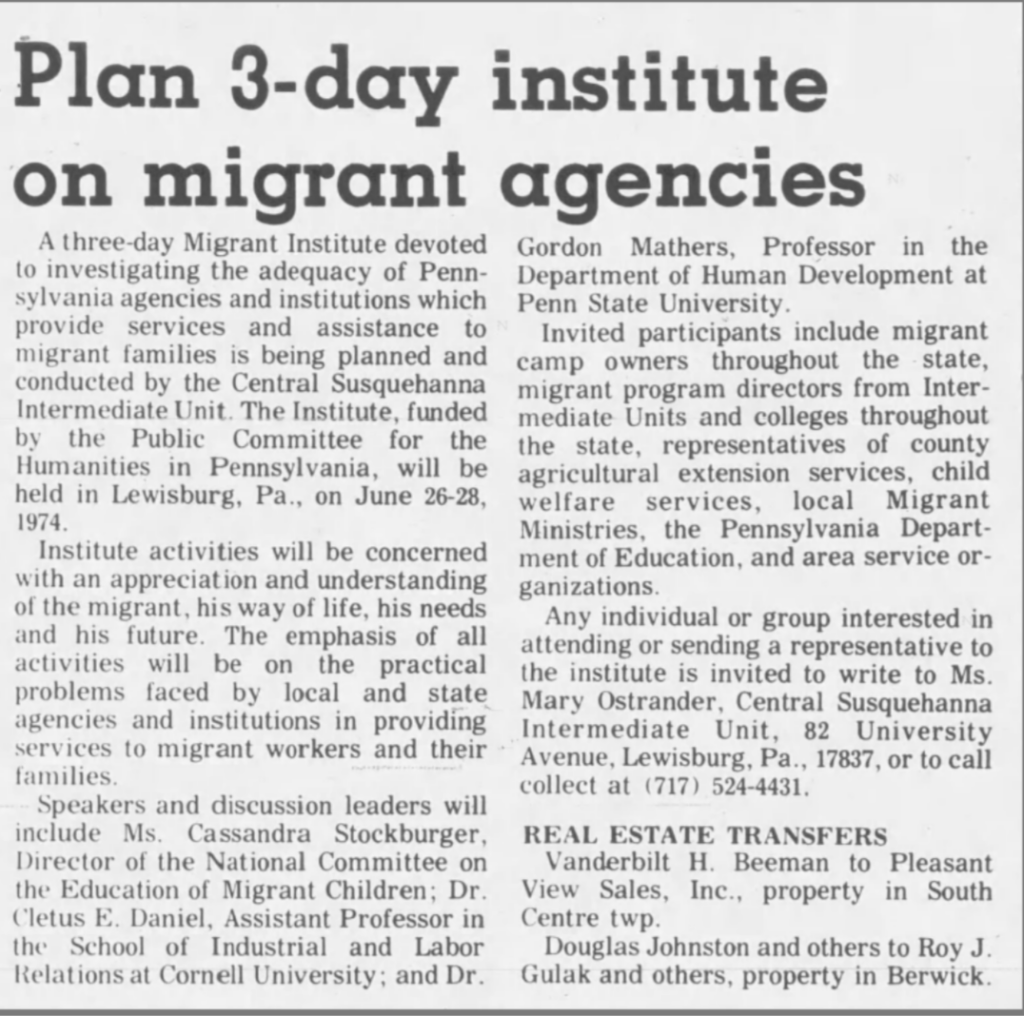
A dialogue between residents of the Back Mountain area, humanists, and the State Correctional Institution to improve understanding of each group’s problems and needs.
Sponsor: Central Susquehanna Intermediate Unit
Amount: $3,000
Project title: Institute on Migrant Farm Workers
A four-day institute, with pre- and post-session follow-up to investigate adequacy of social agencies and institutions in dealing with the migrant family as viewed from humanities viewpoint.
Sponsor: Lancaster-Lebanon Intermediate Unit
Amount: $9,932
Project Title: Overcoming Cultural Barries on the Job and in the Schools: Latin Americans in Lancaster and Lebanon Counties
Description: Eleven Public forums to acquaint businessmen, educators and the community with cultural factors that inter- fere with non-English speaking people’s job performance led by humanists.
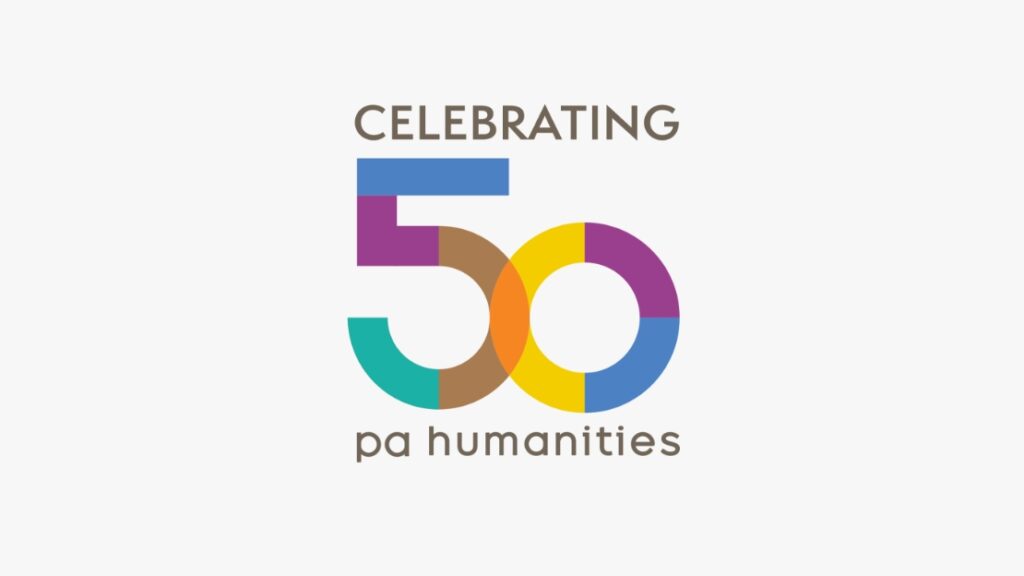

![[color – dark bg] PA SHARP FINAL FILES DB 72dpi [color - dark bg] PA SHARP FINAL FILES DB 72dpi](https://pahumanities.org/uploads/files/elementor/thumbs/color-dark-bg-PA-SHARP-FINAL-FILES-DB-72dpi-phgl7aimtfdpzt2rscvl43ksfv3asbbls19lsvuacw.jpg)
